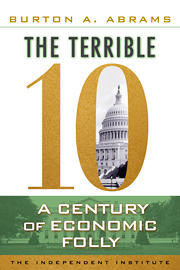The U.S. economy is failing to recover and Nobel laureate Joseph Stiglitz thinks he knows the reason. In a recent New York Times piece, Stiglitz faulted growing inequality in both opportunity and economic outcomes. One wonders what facts or statistical evidence bring him to this conclusion.
Inequalities in opportunity are as narrow as they have ever been in U.S. history. And even in the past, such inequalities never held back U.S. economic recoveries, so why should they do so now?
So perhaps the problem is growing income inequality. Even here, there is ample room for doubt. Income inequality is increasing in the United States according to certain measures, but the picture becomes far murkier when taxes, benefits and entitlements are included. Moreover, it is difficult to find a plausible chain of causation between the phenomenon of inequality and the current economic stagnation.
On the other hand, it is easy to see how a national debt, which comes to $145,000 for each taxpayer, might play a role, as politicians rush to raise the debt ceiling over and over again. Americans and American businesses remain uncertain about future regulation and taxation—especially about the Affordable Care Act—and remain on the sidelines out of fear for the future rather than investing and expanding. Entitlements remain on autopilot, and the Affordable Health Care Act will exacerbate this problem as well.
The popping of the real estate bubble caused a huge loss of household wealth that cannot but impede recovery. Meanwhile, the administration hands out wasteful subsidies to unprofitable industries and firms, drawing private investment away from businesses that are more likely to create lasting jobs. And the extension of unemployment insurance to as long as 99 weeks has provided benefits, but it is also shown to delay workers’ re-entry into the workforce.
Deficit spending and a massive enlargement of an inefficient government sector crowds out the productive private sector. A lack of national savings makes us financially dependent on foreign countries and renders our exports less competitive. Basic economic theory or statistical evidence shows that these factors have negative effects on the economy. Someone as smart as Joseph Stiglitz should know that.
The inequality of economic outcomes, on the other hand, is not clearly a bad thing. It provides the lubricant for a dynamic free-market economic system. A stagnant, equal-income Chinese society was converted into a dynamic growth machine precisely by allowing such inequality. Just try to imagine a Chinese economist claiming that income inequality there is holding back the Chinese economy!
Inequality in rates of return on capital is necessary. It allocates scarce resources to their most productive use. Different occupations yield unequal economic rewards, encouraging those capable of pursuing professions for which fewer people are qualified and more are needed. These adjustments, of course, are not instantaneous, but over time they make the economy more efficient and raise overall standards of living.
Consider also Professor Stiglitz’s solution to the inequality problem. He wants “at least, significant investments in education, a more progressive tax system and a tax on financial speculation.” The trouble is, no country has taxed its way to prosperity. Countries such as Greece and Argentina provide “free” education through the university level and haven’t discovered any magic bullet. China, under the old communist regime, even paid students to go to university but still its economy stagnated.
Liberal economists bemoan growing income inequality in the United States and recommend public policies to force greater equality. They fail to get the big picture and, as a result, their policy recommendations are counterproductive.
America has unparalleled equality of opportunity. As testimonies to this fact, we have a black president and thousands of stories of entrepreneurs moving from poverty and obscurity to great wealth. We also have enough income mobility that our fabled “top 1 percent” of earners is constantly changing, in contrast to static societies where the same people rake in most of the money year after year.
Economic freedom and equality of opportunity are strong forces producing economic growth and prosperity. Now if the government would just deal with the real factors holding back the economy, income inequality would no longer be a scapegoat for the effects of bad public policies.








